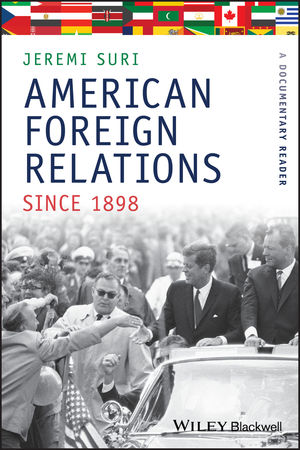|
Textbook
American Foreign Relations Since 1898: A Documentary ReaderISBN: 978-1-4051-8447-2
Paperback
266 pages
April 2010, ©2010, Wiley-Blackwell
 This is a Print-on-Demand title. It will be printed specifically to fill your order. Please allow an additional 10-15 days delivery time. The book is not returnable.
Other Available Formats: Hardcover
|
||||||
List of Illustrations ix
Series Editors’ Preface x
Acknowledgments xii
Source Acknowledgments xiii
Introduction 1
Chapter 1: War, Imperialism, Anti-Imperialism 7
1 Secretary of State, John Hay, Open Door Notes, 1899–1900 7
2 President William McKinley, Account of his Decision to Occupy the Philippines, 1898 11
3 The Platt Amendment, 1901 13
4 Jane Addams, Critique of American Militarism, 1902 15
5 President Theodore Roosevelt, ‘‘Corollary’’ to the Monroe Doctrine, 1904 19
Chapter 2: The Great War and Its Aftermath 24
1 George M. Cohan, ‘‘Over There,’’ 1917 24
2 President Woodrow Wilson, Fourteen Points Address, 1918 26
3 Senator Robert LaFollette, Opposition to President Wilson’s War Message, 1917 32
4 W. E. B. Dubois, Comments on the First World War, the Treaty of Versailles, and the Politics of Race, 1918 36
5 Charles Lindbergh, Account of the First Solo Nonstop Airplane Flight Across the Atlantic Ocean, 1927 40
6 The Kellogg–Briand Pact, 1928 45
Chapter 3: The Great Depression, Fascist Fears, and Social Change in America 51
1 President Franklin D. Roosevelt, First Inaugural Address, 1933 51
2 Hamilton Fish Armstrong, Meeting with Adolf Hitler, 1933 56
3 Father Charles Coughlin, Radio attack on ‘‘Internationalism,’’ 1931 62
4 Charles Lindbergh, Speech to an America First Committee Meeting, 1941 66
5 The Atlantic Charter, 1941 69
Chapter 4: The Second World War 72
1 Lawrence T. Kagawa, the Internment of Japanese-Americans, 1942 72
2 President Franklin Roosevelt and Soviet Marshal Josef Stalin at the Tehran Conference, 1943 74
3 Dwight Eisenhower, the Liberation of Nazi Concentration Camps, 1945 78
4 President Harry Truman, Diary Entries on the Potsdam Conference and his Decision to Drop the Atomic Bombs on Japan, 1945 80
5 The Atomic Mushroom Cloud Over Nagasaki, 1945 83
Chapter 5: The Early Cold War 85
1 George F. Kennan, ‘‘Long Telegram’’ on the Soviet Union, 1946 85
2 The Truman Doctrine, 1947 90
3 Assistant Secretary of State, Dean Rusk, the ‘‘Loss’’ of China, 1950 93
4 Senator Joseph McCarthy, Speech in Wheeling, West Virginia, 1950 96
5 NSC 68, 1950 98
6 President Dwight Eisenhower, the ‘‘Falling Domino’’ Theory in Indochina, 1954 103
Chapter 6: Rebellions Against the Cold War 106
1 Martin Luther King, Jr., ‘‘The Rising Tide of Racial Consciousness,’’ 1960 106
2 ‘‘Spy vs. Spy,’’ 1961 111
3 SANE, Public Petition, 1961 112
4 Students for a Democratic Society, Port Huron Statement, 1962 114
5 Women Strike for Peace, ‘‘What Every Woman Knows,’’ 1962 122
6 ‘‘Dr. Strangelove,’’ 1964 125
7 President Lyndon Johnson, ‘‘Peace Without Conquest,’’ 1965 130
8 Phil Ochs, ‘‘I ain’t marchin’ anymore,’’ 1965 136
9 Christian Appy, Oral Histories from the Vietnam War 137
10 My Lai Massacre, 1968 145
Chapter 7: De´tente, Human Rights, and the Continuation of the Cold War 147
1 President Richard Nixon, ‘‘Opening’’ to China, 1972 147
2 Agreement on Basic Principles between the United States and the Soviet Union, 1972 156
3 American Complicity in Chilean Repression, 1973 159
4 The Helsinki Final Act, 1975 163
5 President Jimmy Carter, Address at the University of Notre Dame, 1977 169
6 President Ronald Reagan, ‘‘Evil Empire’’ Speech, 1983 174
Chapter 8: The End of the Cold War 179
1 President Ronald Reagan, Speech and Questionand-Answer Session at Moscow State University, 1988 179
2 The New York Times, Mikhail Gorbachev’s Heroic Reception in the United States, 1988 189
3 The New York Times, The Fall of the Berlin Wall, 1989 191
4 President George H. W. Bush and Soviet Chairman Mikhail Gorbachev, the End of the Cold War, 1989 196
Chapter 9: After the Cold War 201
1 President George H. W. Bush, the Iraqi Invasion of Kuwait, 1990 201
2 Deputy Secretary of Defense, John Deutch, Genocide in Rwanda, 1994 204
3 President Bill Clinton, the Kosovo Crisis, 1999 206
Chapter 10: The War on Terror 212
1 The Terrorist Attacks of September 11, 2001 212
2 The New York Times, the Public Horror of September 11, 2001 222
3 President George W. Bush, the Bush Doctrine, 2002 225
4 George Packer, the Iraq War, 2005 228
5 Torture at Abu Ghraib Prison, 2004 233
Select Bibliography 235
Index 239



